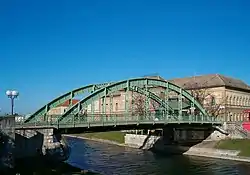ponte
Basque
French
Etymology 1
Nominalized form of an old past participle of pondre.[1]
References
- “ponte” in le Trésor de la langue française informatisé (The Digitized Treasury of the French Language).
- .
- .
Further reading
- “ponte” in le Trésor de la langue française informatisé (The Digitized Treasury of the French Language).
Galician

Ponte (bridge) over the Navia river
Etymology
From Old Galician and Old Portuguese ponte, from Latin pōns, pontem.
Pronunciation
- IPA(key): /ˈpɔnte̝/
Audio (file)
Noun
ponte f (plural pontes)
Derived terms
- Ponte
- Ponte Ambía
- Ponte Caldelas
- Ponte Nova
- Ponteareas
- Ponteceso
- Pontecesures
- Pontedeume
- Pontedeva
- pontella
- Pontepedra
- Pontepedriña
- ponticela
- Pontide
- pontigo
- pontillón
- Pontemaceira
- Pontenafonso
- Pontenova
- Pontevedra
- Pontevella
Related terms
References
- “ponte” in Dicionario de Dicionarios do galego medieval, SLI - ILGA 2006-2012.
- “ponte” in Xavier Varela Barreiro & Xavier Gómez Guinovart: Corpus Xelmírez - Corpus lingüístico da Galicia medieval. SLI / Grupo TALG / ILG, 2006-2016.
- “ponte” in Dicionario de Dicionarios da lingua galega, SLI - ILGA 2006-2013.
- “ponte” in Tesouro informatizado da lingua galega. Santiago: ILG.
- “ponte” in Álvarez, Rosario (coord.): Tesouro do léxico patrimonial galego e portugués, Santiago de Compostela: Instituto da Lingua Galega.
Italian
Etymology
From Latin pontem, accusative case of pōns, from Proto-Indo-European *pónteh₁s (“path, road”), from *pent- (“path”). Compare French pont, Romanian punte, Romansch punt, Spanish puente.
Pronunciation
- IPA(key): /ˈpon.te/
Audio (file) - Stress: pónte
- Hyphenation: pon‧te
Noun
ponte m (plural ponti)
Derived terms
- pontile
- piano di volo
Portuguese

ponte
Etymology
From Old Portuguese ponte, from Latin pontem, accusative singular of pōns, from Proto-Indo-European *pónteh₁s (“path, road”), from *pent- (“path”).
Noun
ponte f (plural pontes)
Synonyms
- (bypass): bypass
Spanish
This article is issued from Wiktionary. The text is licensed under Creative Commons - Attribution - Sharealike. Additional terms may apply for the media files.